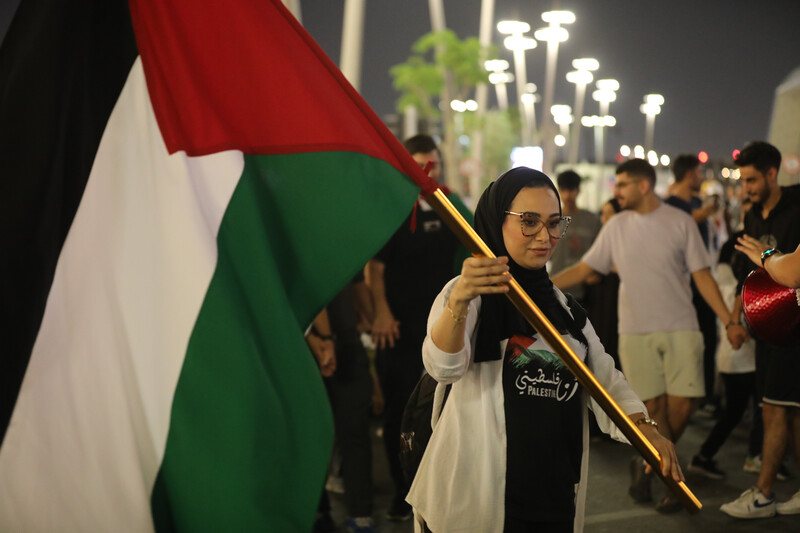The Electronic Intifada 8 December 2022

Football fans in Doha wave the Palestinian flag.
APA imagesHow does it feel to be an Israeli in Qatar?
The question came from Israel’s Channel 12 studio to Ohad Hamo, its correspondent at the World Cup in Doha.
Hamo’s answer was revealing.
“Our presence here with the Israeli flag and Hebrew language is problematic,” Hamo said, before Channel 12 showed a clip of him trying to interview a fan in Arabic, who insisted there was no such thing as Israel, only Palestine.
“There are many attempts from people here from Arab countries to oppose us,” Hamo said, while telling his audience that on a personal security level, he felt safe. “We signed four normalization agreements with Arab regimes over the past few years,” he went on to lament, yet most Arabs he had spoken to did not want him there.
Endless clips from Doha on social media of young Arab football fans refusing interviews with Israeli journalists, the Palestinian flag being held high or draped over shoulders, suggest that Israel’s much vaunted attempts at normalizing with the Arab world has gone as far as a few heads of government. And no further.
What the World Cup, 2022 edition, seems to have made clear is that ordinary Arabs still look at Israel as a colonial intrusion whose existence they instinctively reject, and still look to Palestinians as their brethren.Dor Hoffman, a correspondent for Kan, an Israeli state broadcaster, talked about his personal experience in Qatar. The studio had caught him on what he professed was a “bad day.”
“It started when we ordered a taxi,” he began, before relating how the driver had dropped him and his crew on the side of the road when he learned they were Israeli, refusing payment.
“He said we are killing his brethren.”
That was just the beginning. When he and his crew later went to a restaurant, Hoffman told his viewers, the owner, after learning they were Israeli, had them thrown out.
“He took my phone and requested that I delete every picture taken in his restaurant.”
Viva Palestine
The examples are numerous and many short videos have spread on social media.
In one, the journalist asks a man, “Are you Qatari?” The man replies in the affirmative and then asks which channel is asking.
The journalist says he is from Israel and the man walks away saying, “sorry.” The journalist tries to talk to two other men nearby but they simply ignore him and continue walking.
One of the Lebanese men asks: “You’re from Israel?” The journalist affirms.
They all turn around and walk away, and as they do, one of them says to the journalist, “Why did you come here? It is Palestine. Israel doesn’t exist.”
Elsewhere, an Israeli journalist doing a live feed with two Egyptian youths says in Hebrew: “We came together to watch the soccer match. Are you happy?”
One of the Egyptians ignores him and instead says into the microphone: “Viva Palestine.”
Another clip shows an Israeli journalist doing a piece to camera. A group of Arab supporters, standing at a short distance, chant “get out” and “Palestine, Palestine,” while waving Palestinian flags.
In another clip, an Israeli journalist in a market tries to speak to an at first very welcoming Qatari youth. Once he heard the crew was from Israel, however, he immediately changed attitude and refused to be interviewed.So it goes on. And all those clips told just one story: whatever the positions of their governments, these were the real opinions of Arabs towards the colonialist Israeli state.
The extensive efforts by Israel over the past few years to break its psychological isolation and to open up its Arab surroundings have succeeded only at the official level.
Popular rejection
As a Palestinian, Arab and human, I was not pleased with Qatar’s decision to allow Israeli journalists into the country for the World Cup. However, the presence of Israeli media around Arab football fans is a rare opportunity to gauge popular opinion.
And it showed – with abundant clarity – that the prevailing attitude is a strong, moral, popular Arab rejection of normalization with Israel, the colonial entity.
In Israeli calculations, any success in reaching out to Arab masses is a step toward normalizing Israel’s existence. As a result, Israeli journalists put up with their isolation and humiliation in an attempt to break the psychological barrier among Arabs.
They tried to convey to the Arabs that, essentially, they are just the same.
Israel attempts to use soft power to break through any small opening – whether in sports, culture, art or the economy – to desensitize Arabs to Israel’s existence. Unofficial ambassadors, in this case journalists at the World Cup, appear disarming in jeans and t-shirts to change the stereotypical impression of the Israeli as an armed soldier chasing children or bombing innocent people.
Such cosmetic attempts come up against a collective Arab knowledge of how Israel came to be. Arabs know full well the campaign of terror, ethnic cleansing and massacres against their Palestinian brethren that made way for Israel.
This state is not normal. It cannot enjoy the same stability and relations as normal states.
Israel was imposed on the region through brute colonial force. Its citizens were brought to replace Palestinians, who in turn were uprooted from their homeland.
The Arab rejection of the Israeli presence in the Qatar World Cup also highlights the glaring chasm between official policies and popular attitudes in the Arab world, a chasm to be expected due to the absence of democracy.
Accords, shmaccords
Israel may have succeeded in signing agreements with a number of Arab countries whose governments are susceptible to political and economic pressure. However, no one can force the Arab people to accept Israel.
Ohad Hamo, the Israeli journalist, summarized the situation quite accurately.
Personal security, he said, is fine. “However, many among the people reject our existence.”
Governments can guarantee security at official events. However, they cannot force the people to welcome colonialists.
Palestinian flags have been waved at almost every match. Fans, and in some cases even footballers, have draped themselves in the Palestinian flag.
The enormous support shown for Palestine at the World Cup prompted the Brazilian writer Daniel Mundim to devote an entire article to Palestine, described as the 33rd contestant in the tournament.Palestine, “the nation that fights for a recognition that has already come in football,” he wrote in Brazil’s O Globo newspaper, “is the one that unites the Arab countries in the World Cup.”
For Palestinians, meanwhile, the footage of Arab youth telling Israeli journalists there is no Israel, only Palestine, engenders hope and relief that the true identity of the Arab people persists.
Palestinians are not alone in facing the Zionist project even if Arab support is currently limited to the moral sphere.
Ahmed Abu Artema is a Palestinian writer, activist and refugee from Ramle.





